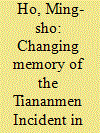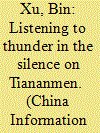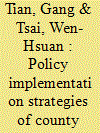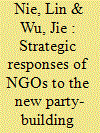|
|
|
Sort Order |
|
|
|
Items / Page
|
|
|
|
|
|
|
| Srl | Item |
| 1 |
ID:
184089


|
|
|
|
|
| Summary/Abstract |
This article examines the three-decade evolution of remembering the Tiananmen Incident in Taiwan by looking at annual commemorative activities. There is a decisive shift from a patriotic understanding to a cosmopolitan perspective grounded in universal values. The earlier memory was based on an ethnic nationalism that stressed consanguinity among Taiwanese and mainland Chinese and a narrative of the Chinese Republican Revolution. However, such framing lost its persuasiveness and the memory of Tiananmen faded as Taiwanese, particularly the younger generation, embraced an indigenous identity. China’s rapid economic growth and its ascendency as a new world power neutralized the potency of the earlier memory because it demonstrated the possibility of nationalistic aspirations without democracy. Since 2011, commemorative rallies have revived and proceeded with a newer understanding of the Tiananmen Incident in terms of human rights, civil society, and youth activism. This article argues that this ‘mnemonic change’ reflects Taiwan’s democratization and the indigenization of Taiwanese society, enabling young organizers to articulate their own Tiananmen memory by referencing global civil-society activism. Mnemonic change in Taiwan is examined with a comparative reference to the parallel development in Hong Kong.
|
|
|
|
|
|
|
|
|
|
|
|
|
|
|
|
| 2 |
ID:
184090


|
|
|
|
|
| Summary/Abstract |
It is difficult to conduct ethnographic inquiries into how China’s rural migrant individuals make decisions about their bodies and their sexual capital, and to date there have been few attempts to do so. Equally scant are examinations of the moral, cultural, and political frameworks that rural migrant workers who live in poverty and in the socio-economic margins use to make sense of sexual decisions and choices. This article starts with an ethnographic glimpse into the lives of some sex workers in Shenzhen, and proceeds to analyse a range of texts: a novella, a novel, a cluster of news stories (from both commercial and state media), and a feature story in a popular lowbrow magazine. Pitting these texts against sex workers’ own statements, as well as reading the texts in juxtaposition, brings into sharp relief the contradictions, connections, and coalitions between a range of discursive positions. The analysis suggests that a critical socio-economic framework, rather than a normative framework of transgression, may get us closer to understanding the emotional consequences of inequality. The analysis also demonstrates that for investigations into how inequality shapes intimacy, cultural texts may contain useful ethnographic insights that complement more traditional ethnographic methods.
|
|
|
|
|
|
|
|
|
|
|
|
|
|
|
|
| 3 |
ID:
184085


|
|
|
|
|
| Summary/Abstract |
How should we understand the formation of the grid management system (网格化管理) of grass-roots governance in China? In this article, I argue that the grid system is an extension of existing governance structures. Facing conflicting central messaging, local grid development encountered isomorphic pressures, leading grids to resemble higher-level administration and to inherit a top–down and stability-focused mode of operation. To support this argument, I analyse five aspects: shifts in elite-level discourse, the proliferation of the grid system, recruitment standards for grid members, grid members’ tasks, and their assessment. Showcasing wide local variety, the grid system retains a managerial approach while collapsing service provision into security.
|
|
|
|
|
|
|
|
|
|
|
|
|
|
|
|
| 4 |
ID:
184088


|
|
|
|
|
| Summary/Abstract |
‘Forgetting’ has been widely used in academic and public discourses of the memory of the 1989 Tiananmen Incident. The term, however, is conceptually unclear, empirically ineffective, and ethically problematic. Conceptually, it relies on a problematic assumption that silence means forgetting. Empirically, it lumps together different states of memory: ‘don’t remember, don’t talk about, don’t know, and don’t care.’ Ethically, it allows a broad, unjust moral accusation of those who remember but remain silent for various reasons. I argue that ‘silence’ provides greater conceptual precision, more analytical subtlety, and less ethical liability. Silence does not mean forgetting. Nor does it always mean the complete absence of sound. Rather, it refers to the absence of certain discourses about the past. I propose a perspective based on different forms of silence – ‘silencing, silenced, and silent’ – and illustrate it in an analysis of the memory of Tiananmen. Contrary to conventional wisdom, the analysis shows that the Chinese state initially intended to create a ‘covert silence’ – forcing people to remember rather than forget the official stories and silencing other narratives – and then an ‘overt silence’ in which all mention of the event was absent. Even underneath overt silence, however, are various experiences with ambiguities and nuances. The term silence also recognizes individuals’ ethical-political dilemmas under a repressive regime and aims to provide a language for an equal and inclusive truth-and-reconciliation process in the future.
|
|
|
|
|
|
|
|
|
|
|
|
|
|
|
|
| 5 |
ID:
184086


|
|
|
|
|
| Summary/Abstract |
Using the concept of ‘hedging’, we explore how local cadres in China deviate from central policies in order to serve local interests and, while doing so, avoid being called to account by their superiors. Political signals enable cadres to decide when to invest more resources into the implementation of certain policies. In this way, they optimize their performance and avoid the political risks involved in failing to carry out their designated tasks. This article uses county Y as an example in a discussion of county-level implementation of policies related to economic growth and air pollution control. We find that local cadres weaken the functions of the superior ‘special inspection team’ (专项督察组, hereafter inspection team), treating them as political instruments used by the central and local authorities to ensure a greater level of responsiveness at the grass roots. Information concerning the imminent arrival of an inspection team in their locality acts as a signal for cadres to allocate more resources to the enforcement of air pollution control measures, thus maximizing their performance in this area. Through this research, we have endeavoured to provide a deeper understanding of the operating logic of Chinese local governments and the behaviour of county cadres.
|
|
|
|
|
|
|
|
|
|
|
|
|
|
|
|
| 6 |
ID:
184087


|
|
|
|
|
| Summary/Abstract |
Over the last decade, the Chinese Communist Party (CCP) has sought to assimilate the third sector – non-governmental organizations (NGOs) – through its party-building campaign. This article examines NGOs’ strategies in response to this campaign, based on in-depth interviews with 64 NGOs and local cadres. We find that NGOs have developed three main strategies to respond to the CCP’s attempts to penetrate their organizations. First, NGOs embedded in the party-state system and those affiliated with private enterprises tend to acquiesce to party building out of habit and for compliance reasons, respectively. Second, those with multiple stakeholders generally compromise in the party-building process, acting as passive compliers if they depend more on non-state resources, or active players if they rely more on state resources. Third, civic NGOs that advocate causes inconsistent with the ruling regime might avoid party building as a resistant strategy, by either disguising their nonconformity or escaping from the control of the ruling regime entirely. NGOs’ strategic responses are contingent on their negotiating power, which results from their resource dependence and the party’s enforcement dilemmas. This article contributes to our understanding of the recent party-building campaign from an institutional perspective, and enriches our knowledge about relations between the party and the third sector.
|
|
|
|
|
|
|
|
|
|
|
|
|
|
|
|
|
|
|
|
|